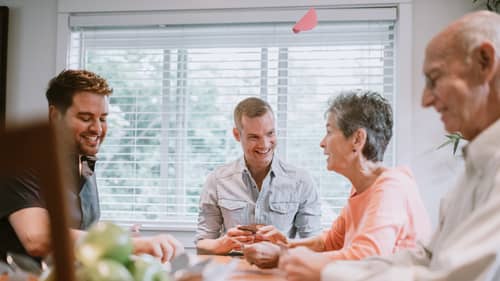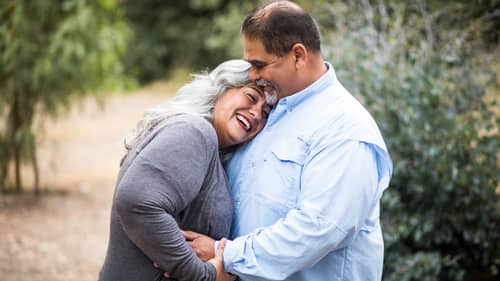Find the Best Resources for You
Each mental wellness journey is unique, so what you need might look different from what others need. We’ve gathered a wide variety of resources ranging in topics and support needs. Flip through to find the best options for you.
-

Support
The link between social support and mental wellness is strong.
-

Boundaries
Boundaries enable us to create an environment that supports recovery.
-

Grief
Talking about grief and loss helps us cope.
-

Mindfulness
Mindfulness increases self-awareness, self-acceptance, and self-compassion.
-

Coping Skills
Coping skills help regulate emotions, have effective communication, and navigate stress.
-

Helping a Loved One
You can be an effective part of your loved one’s support system.
Support Through Community Connection
When we’re surrounded by people who accept us fully for who we are, we’re more likely to feel supported, loved and valued. That’s one of the reasons such a strong link exists between community and mental health. Human beings tend to thrive when they’re in communities — and struggle more in isolation.
Increase your community by learning more about what type of community would be most helpful to you, joining a support group, or connecting with others online through platforms like Facebook or Instagram.

-

Pathlight Peer Support Groups
Pathlight offers support groups for anxiety and mood disorders.
-

Loneliness vs. Solitude - Is There a Difference?
Take a deeper look at loneliness vs. solitude and how they affect our mental health.
-

Impact of Community on Mental Health (and How to Find Yours)
Learn the five benefits of social connection, and resources to find support.
Creating and Maintaining Boundaries
The holidays can come with many challenges or demands. Knowing what our needs and desires are, and being able to express those to others can help us protect our mental well-being.
"A boundary lets those in my life know what is acceptable to me and unacceptable. A boundary says, 'This is the line, and this is how you cross it.' They are actually what creates authentic connections and are centered in my values."
"It is okay to not spend the holidays with people who do not share your values. You are worthy of boundaries, self-care and deserve good mental health. We must take care of ourselves. This allows us to be more present for those who want to share this time of year together."
Recognizing Grief During the Holidays
The holidays can remind us of what we’re grateful for. They can also remind us of who we’ve lost or what we don’t have. What do we do with these difficult feelings? How do we navigate them during the holidays - a time when we might feel pressure to be joyful or celebratory? These tips and resources can help you learn how to talk about your grief and how to cope, or how to support others who are grieving.

Practicing Mindfulness and Meditation
According to psychotherapist Dr. Russ Harris, mindfulness is simply “paying attention with openness, curiosity, flexibility, and kindness.” Mindfulness can help us increase self-awareness and develop self-acceptance and self-compassion. Practicing mindfulness during the holidays can be a powerful way to experience more balance, calm and peace. Mindfulness doesn’t mean we won’t experience any difficult emotions or thoughts, but it can help us be less reactive to these experiences – acting within our wisdom and values when moving through challenges.
Many of us think of mindfulness as the same as meditation. But that is actually not true. While meditation can be a great way to access mindfulness, you don’t have to use it in order to practice mindfulness. Allow yourself to pick the mindfulness or meditation practices that are most helpful to you.

Developing Coping Skills for Mental Health
Learning coping skills is an important part of developing and maintaining mental wellness. Coping skills can help us regulate our emotions, have effective communication with others, and navigate stressful situations; all of which could come in handy while preparing for, or actively dealing with holiday challenges. Whether you’re just starting out or need some refreshers, these resources can provide you some tips for where to start.

Helping a Loved One

Need More Support? Learn About Treatment Options.
When mood, anxiety or trauma-related disorders start to impact our day-to-day lives, and we’re unable to manage symptoms on our own or with outpatient care, it’s time to consider a little extra support. Pathlight Mood & Anxiety Center offers a full spectrum of mood, anxiety and trauma-related services for children, adolescents and adults of all genders. We are committed to an environment of cultural humility: grounded in a foundation of safety, mindfulness, and awareness to ensure the best environment for engagement, learning and recovery.
-

Treatment and Services for Children and Adolescents
When your child is struggling with a mood and anxiety disorder, their pain is your pain. This experience can feel distressing, isolating and – at times – hopeless. Pathlight’s goal is to guide you and your child on a path to long-lasting change, healing, and life-changing recovery. -

Treatment and Services for Adults
Pathlight’s adult programming offers mood and anxiety disorder treatment for all genders ages 18 and older — bringing together a highly experienced, multidisciplinary team of experts to address the physical, psychological and social implications of these conditions.
Speak With a Mental Health Professional Today
Connect with an experienced mental health professional to understand how Pathlight can help you or your loved one. This conversation is free and there is no commitment required. We're here to help. Call us at 877-711-1878 or schedule a time to talk.

Hide Last Child Layout Div
